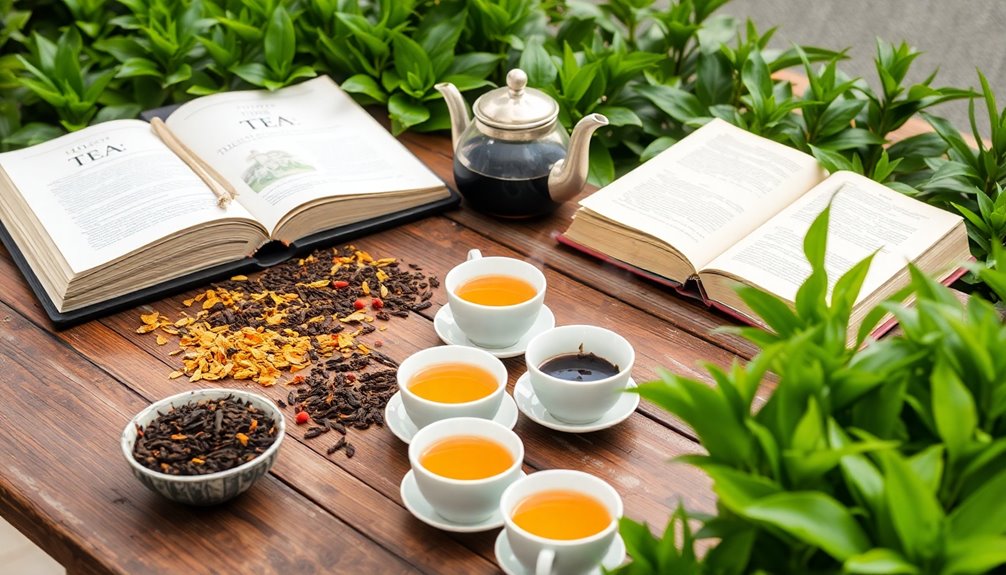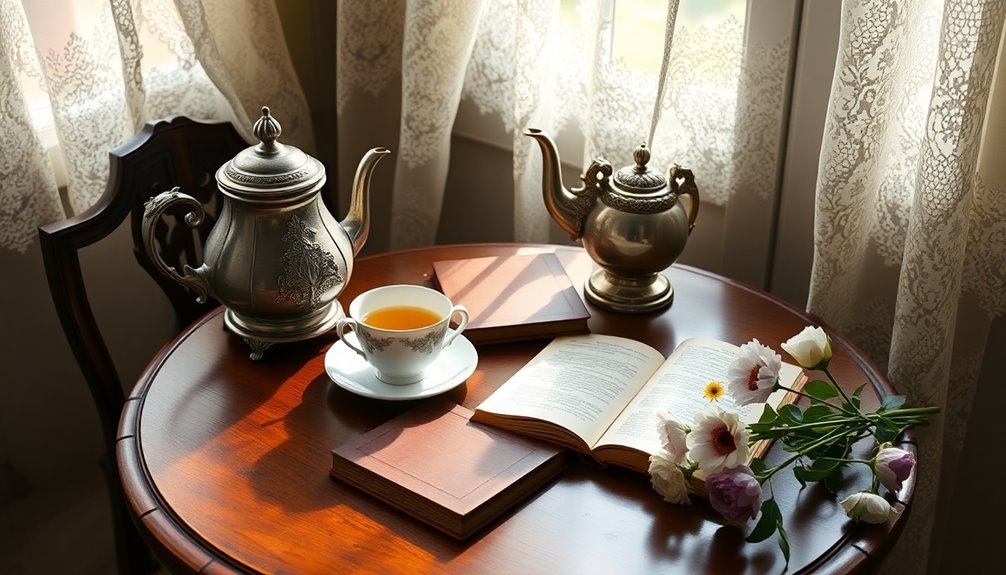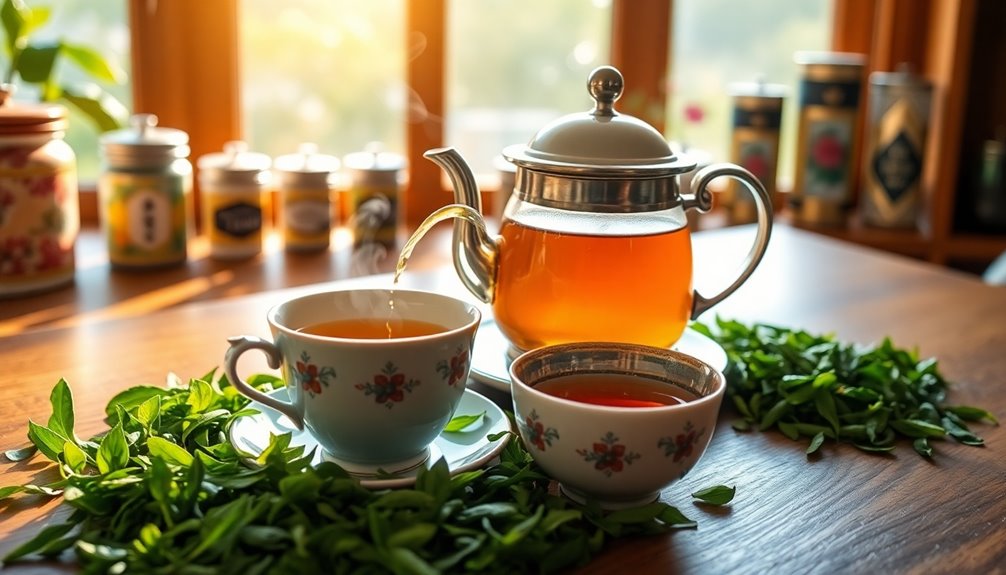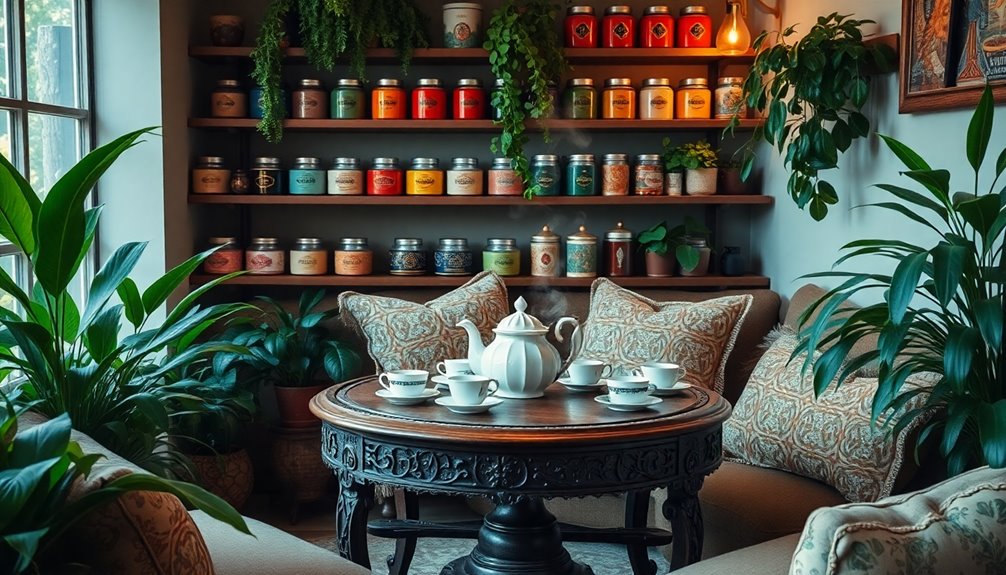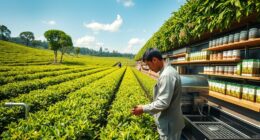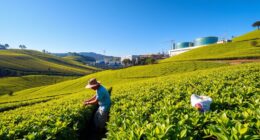If you want to explore the rich tapestry of tea, check out the top 10 must-read books that cover everything from historical significance to cultural rituals. These texts reveal tea's fascinating origins and its evolution through centuries. You'll learn about unique brewing techniques, the global tea market, and even sustainable farming practices. Whether you're a casual drinker or a die-hard enthusiast, these books offer insights that'll deepen your appreciation for tea. There's so much more to uncover about this beloved beverage, and the best is yet to come!
Key Takeaways
- Explore foundational texts on tea's history and cultural significance, tracing its evolution since 758 AD.
- Discover practical brewing techniques and health benefits in essential reads for both casual drinkers and enthusiasts.
- Delve into regional tea rituals, such as the Japanese tea ceremony and Indian chai culture, to appreciate diverse traditions.
- Investigate sustainable tea farming practices and the rise of organic production in response to consumer preferences.
- Learn about the global tea market trends, including China's dominance and the growing demand for specialty teas.
Introduction
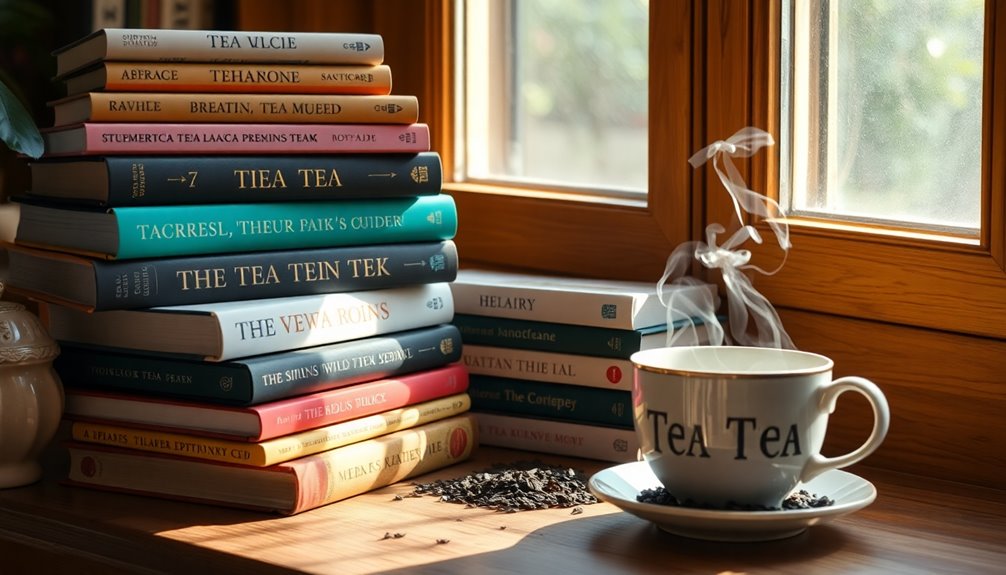
Tea enthusiasts and newcomers alike will find that the world of tea literature is rich and varied, offering a treasure trove of insights into this beloved beverage. From the history of tea to the cultural practices surrounding it, these books serve as a comprehensive guide for anyone eager to explore the many facets of tea.
You'll discover must-read titles that delve into the different types of tea, each with its unique flavors and characteristics. Books like "The Tea Book" by Louise Cheadle and Nick Kilby not only discuss brewing techniques but also highlight the health benefits of tea, making it an essential read for those interested in wellness.
Historical texts, such as "The Classic of Tea" by Lu Yü, provide foundational knowledge that helps you appreciate how tea has evolved since 758 AD.
As tea's popularity continues to soar, the literature surrounding it grows richer, catering to both casual drinkers and dedicated enthusiasts. Embracing this literary journey will enhance your understanding and appreciation of tea's fascinating history, culture, and its role in our lives today.
Historical Significance of Tea
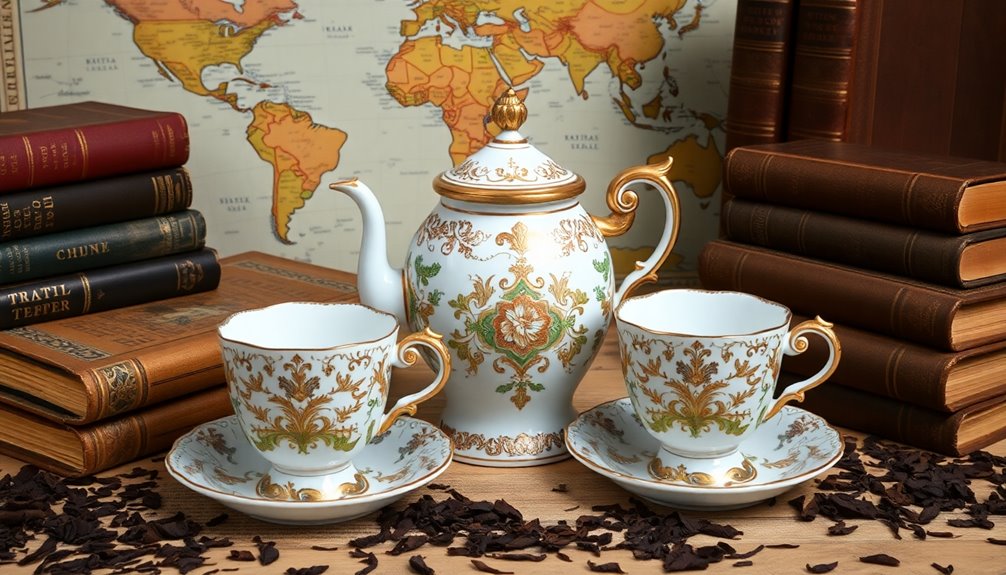
Throughout history, the significance of tea has transcended mere enjoyment, shaping economies, cultures, and social practices across the globe. You might be surprised to learn that tea history dates back to its origins in China around 2737 B.C. It became a major player in the tea trade, particularly during the British Empire when the British East India Company introduced it to Europe in the 17th century.
This not only affected economies but also sparked cultural exchanges along the Silk Road, connecting East and West.
In the American context, the Boston Tea Party of 1773 marked a crucial moment in the American Revolution, symbolizing resistance against British taxation. Books like *Tea: A Cultural History* and *True History of Tea* delve into these events and their impact on society.
They reveal the historical significance of tea beyond beverage status, highlighting how it has influenced social norms and practices. The Japanese tea ceremony, for instance, showcases these unique cultural rituals that are integral to understanding the social history of tea.
Cultural Rituals Surrounding Tea
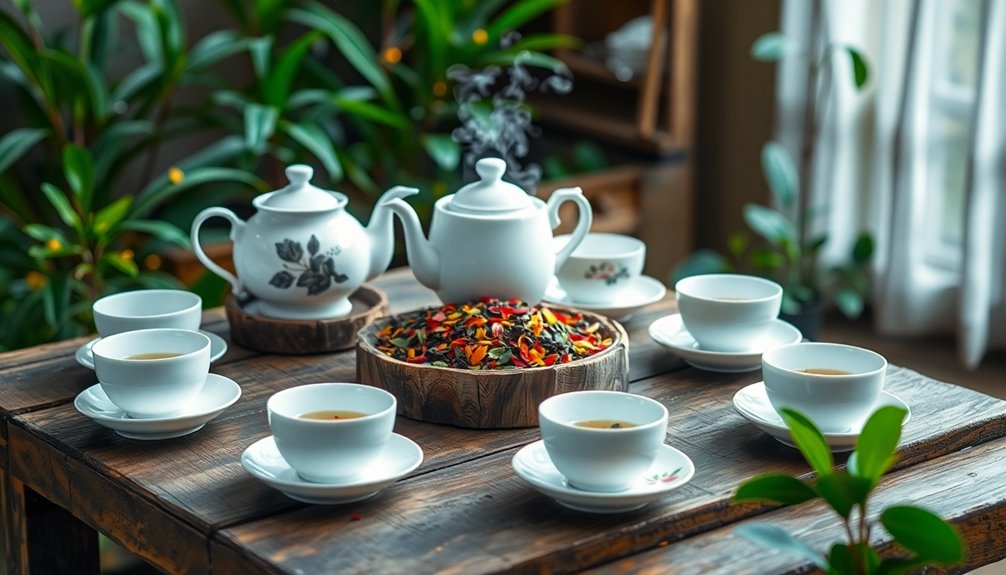
The rich history of tea naturally leads to the diverse cultural rituals that surround its preparation and consumption. For tea enthusiasts, understanding these tea rituals enhances appreciation for this beloved beverage.
The Japanese tea ceremony, or Cha-no-yu, emphasizes mindfulness and aesthetic presentation, creating a serene experience. In contrast, British afternoon tea centers on social gatherings, featuring delicate pastries and sandwiches alongside a pot of fragrant tea.
Chinese tea ceremonies showcase intricate brewing and serving techniques, often performed as a sign of respect and hospitality. Meanwhile, Indian chai culture blends tea with spices and milk, reflecting regional flavors and making it a staple in daily life and social interactions.
In the Middle East, tea customs involve elaborate serving methods, fostering communal gatherings and connections.
These rituals not only highlight the cultural history surrounding tea but also play a significant role in the global tea market, valued at approximately $200 billion in 2021. As tea producers continue to innovate, these cultural practices will evolve, enriching the experience for tea lovers worldwide.
Embracing these rituals deepens your connection to tea and its diverse heritage.
Global Tea Production Trends
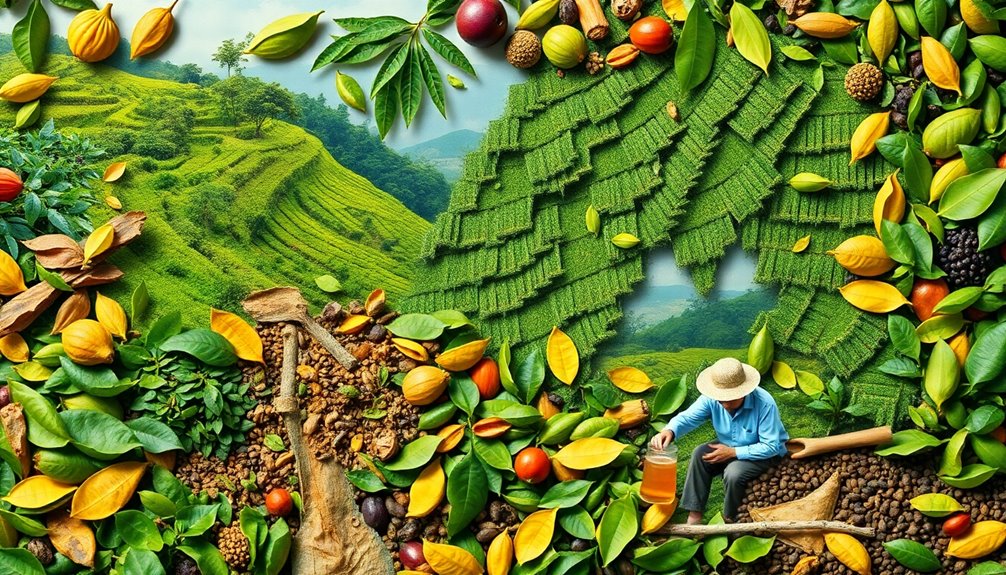
In recent years, global tea production has evolved dramatically, influenced by shifting consumer preferences and environmental challenges. As a tea enthusiast, you might be interested to know that China remains the largest producer, accounting for over 30% of global tea production, followed closely by India, Kenya, and Sri Lanka.
The global tea market was valued at approximately $200 billion in 2021, showcasing its significant economic impact on the tea business.
With health benefits of tea gaining traction, organic tea production is on the rise, appealing to health-conscious consumers who prioritize sustainably sourced products. In this dynamic tea industry, the demand for specialty tea has also surged. This reflects a growing interest in innovative tea options that cater to health-focused consumers.
However, climate change poses a serious threat to future tea cultivation, impacting yields and quality in major producing regions.
As tea culture continues to adapt, it's essential to stay informed about these trends. Understanding global tea production trends helps you appreciate the complexities behind your favorite brews and fosters a deeper connection to the world of tea.
Sustainability in Tea Farming
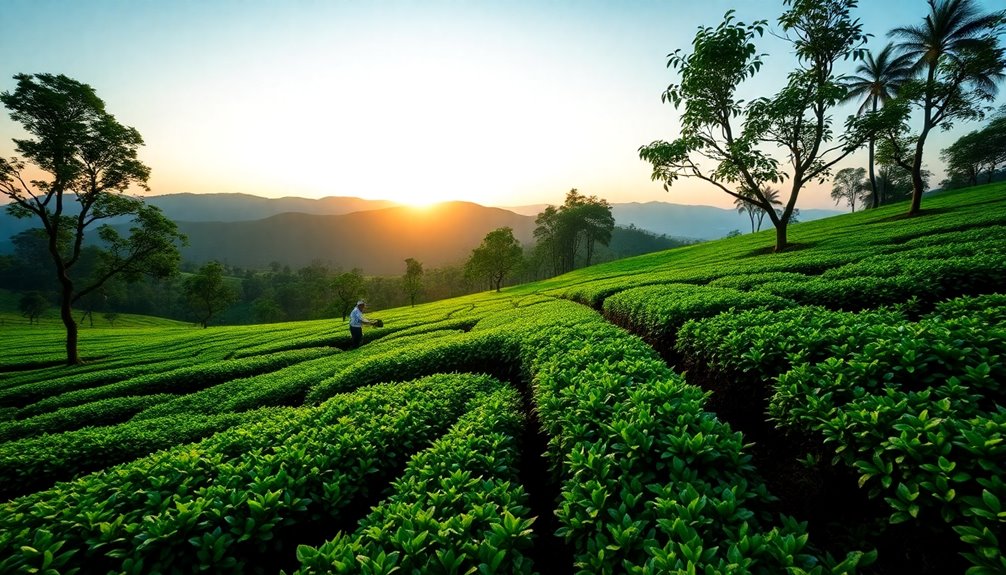
As climate change continues to reshape agriculture, sustainability in tea farming has become a critical focus for producers and consumers alike.
You might be surprised to learn that sustainable tea farming practices emphasize reducing chemical inputs and promoting organic cultivation. By adopting environmentally friendly pest control methods, farmers can maintain soil health and enhance biodiversity, which is essential for resilient tea cultivation.
With climate change posing significant challenges, like rising temperatures and unpredictable weather patterns, it's crucial for tea producers to implement resilient agricultural practices.
Certification programs, such as Rainforest Alliance and Fair Trade, play a vital role in encouraging sustainable practices among tea farmers by promoting environmental stewardship and fair labor conditions.
The growing consumer preference for organic tea is evident, with organic tea production rising by 20% annually.
This demand highlights the need for farmers to adopt agroforestry systems, which can improve carbon sequestration and biodiversity while offering additional income through complementary crops.
Practical Applications

Sustainable practices in tea farming not only protect the environment but also open up new opportunities for enjoying tea. By exploring books like *The Tea Enthusiasts Handbook*, you'll deepen your understanding of various tea types and traditional tea ceremonies, enriching your overall experience.
*The Harney & Sons Guide to Tea* stands out for its practical tips on brewing techniques and tasting insights, helping you appreciate the nuances in flavor.
If you're looking to elevate your culinary skills, *The Art and Craft of Tea* offers tea-infused recipes that introduce unique flavors to your dishes. This book encourages you to experiment with tea in your cooking, expanding your palate.
For those aspiring to become a tea sommelier, *Tea Sommelier: A Step-by-Step Guide* provides the necessary skills for tea tasting and food pairing, making the journey enjoyable and rewarding.
Additionally, incorporating sustainable practices in tea production can enhance the quality and flavor profile of your brews.
Whether you're a casual drinker or a serious enthusiast, these resources will help you apply your knowledge practically. Embrace the art of tea, and you'll find it enhances not just your beverages but also your culinary experiences.
Conclusion
In exploring these ten must-read books about tea, you've uncovered not just the drink's rich history and cultural significance but also its role in global production and sustainability. Each book offers unique insights that deepen your appreciation for this beloved beverage. As you sip your next cup, remember the stories and traditions behind it, and consider how you can contribute to a more sustainable future in tea. Enjoy your journey through the world of tea literature!

